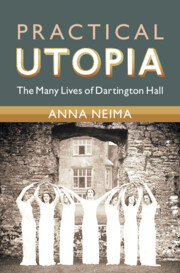Refine search
Actions for selected content:
3 results
3 - Education for Change
-
- Book:
- Practical Utopia
- Published online:
- 21 April 2022
- Print publication:
- 28 April 2022, pp 88-144
-
- Chapter
- Export citation
5 - Regenerating Rural Life
-
- Book:
- Practical Utopia
- Published online:
- 21 April 2022
- Print publication:
- 28 April 2022, pp 201-262
-
- Chapter
- Export citation

Practical Utopia
- The Many Lives of Dartington Hall
-
- Published online:
- 21 April 2022
- Print publication:
- 28 April 2022
